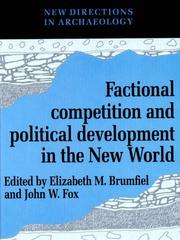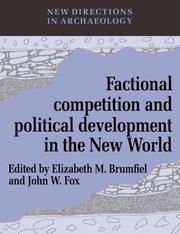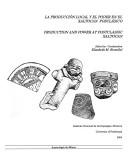| Listing 1 - 5 of 5 |
Sort by
|
Book
ISBN: 9781444334036 1444334034 Year: 2008 Publisher: Malden, MA : [Arlington, Va.] : Blackwell ; American Anthropological Association,
Abstract | Keywords | Export | Availability | Bookmark
 Loading...
Loading...Choose an application
- Reference Manager
- EndNote
- RefWorks (Direct export to RefWorks)
Social archaeology --- Sex role --- Households --- Feminist archaeology. --- Division of labor --- Social structure --- Economics, Prehistoric. --- Archéologie sociale --- Rôle selon le sexe --- Ménages (Statistique) --- Féminisme et archéologie --- Division du travail --- Structure sociale --- Economie préhistorique --- History. --- Histoire

ISBN: 0521321182 Year: 1990 Volume: vol *28 Publisher: Cambridge : Cambridge university press,
Abstract | Keywords | Export | Availability | Bookmark
 Loading...
Loading...Choose an application
- Reference Manager
- EndNote
- RefWorks (Direct export to RefWorks)
Commerce [Prehistoric] --- Commerce préhistorique --- Cultural evolution --- Cultural transformation --- Culture [Evolution of ] --- Evolutie [Sociale ] --- Evolution sociale --- Handel [Prehistorische ] --- Maatschappelijke organisatie --- Maatschappelijke structuur --- Organisation sociale --- Social evolution --- Social organization --- Social structure --- Sociale evolutie --- Sociale organisatie --- Sociale structuur --- Structure sociale --- Trades --- Exchange, Prehistoric --- Prehistoric commerce --- Methoden en technieken in de archeologie: uitgraven; conserveren; restaureren --- Commerce, Prehistoric. --- 902.3 Methoden en technieken in de archeologie: uitgraven; conserveren; restaureren --- 902.3 --- 930.21 --- Commerce, Prehistoric --- Occupations --- -Social evolution --- Organization, Social --- Culture, Evolution of --- 930.21 Historiografie. Geschiedenis van de geschiedwetenschap --- Historiografie. Geschiedenis van de geschiedwetenschap --- Career patterns --- Careers --- Jobs --- History --- Anthropology --- Sociology --- Social institutions --- Culture --- Evolution --- Social change --- Social evolution. --- Social structure. --- History.

ISBN: 0521384001 0521545846 0511598408 Year: 1994 Publisher: Cambridge : Cambridge University Press,
Abstract | Keywords | Export | Availability | Bookmark
 Loading...
Loading...Choose an application
- Reference Manager
- EndNote
- RefWorks (Direct export to RefWorks)
Factionalism is an important force of social transformation, and this volume examines how factional competition in the kinship and political structures in ancient New World societies led to the development of chiefdoms, states and empires. The case studies, from a range of New World societies, represent all levels of non-egalitarian societies and a wide variety of ecological settings in the New World. They document the effects of factionalism on the structure of particular polities: for example, how it might have led to the growth of social inequality, or to changing patterns of chiefly authority, or to state formation and expansion, or institutional specialisation. The work is a creative and substantial contribution to our understanding of the political dynamics in early state society, and will interest archaeologists, anthropologists, political scientists and historians.
Indians --- Political anthropology --- Social archaeology --- Indiens d'Amérique --- Anthropologie politique --- Archéologie sociale --- Politics and government --- Antiquities --- Politique et gouvernement --- Antiquités --- America --- Amérique --- Antiquities. --- Social Sciences --- Archeology --- Indian antiquities --- Indian artifacts --- Antiquities, Prehistoric --- Archaeology --- Anthropology, Political --- Government, Primitive --- Ethnology --- Political science --- Politics and government. --- Methodology --- Anthropological aspects

ISBN: 9780511598401 9780521384001 9780521545846 Year: 1994 Publisher: Cambridge Cambridge University Press
Abstract | Keywords | Export | Availability | Bookmark
 Loading...
Loading...Choose an application
- Reference Manager
- EndNote
- RefWorks (Direct export to RefWorks)

ISBN: 9703502776 1877812811 Year: 2005 Publisher: Mexico, D.F. Pittsburgh Instituto Nacional de Antropología e Historia University of Pittsburgh
Abstract | Keywords | Export | Availability | Bookmark
 Loading...
Loading...Choose an application
- Reference Manager
- EndNote
- RefWorks (Direct export to RefWorks)
Aztec --- Postclassic --- Ethnology. Cultural anthropology --- social anthropology --- Tlaxcala --- Aztec [culture or style]
| Listing 1 - 5 of 5 |
Sort by
|

 Search
Search Feedback
Feedback About UniCat
About UniCat  Help
Help News
News